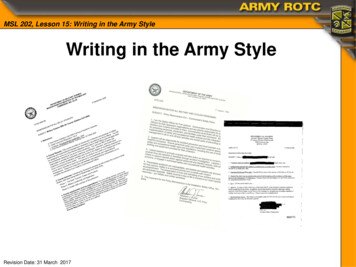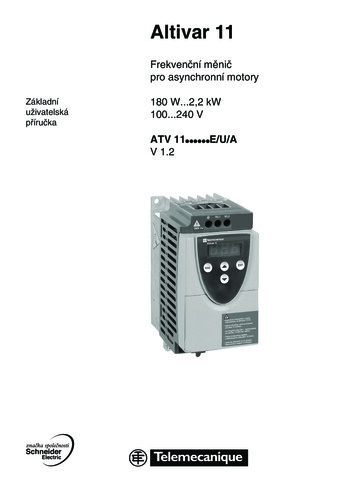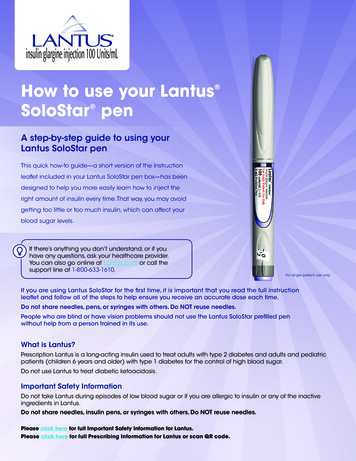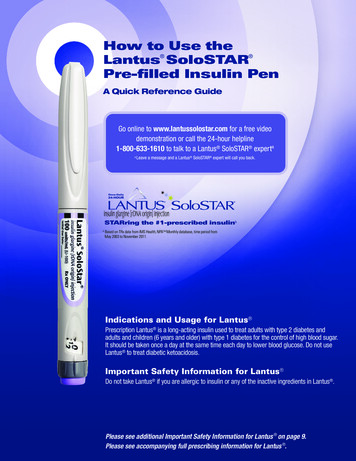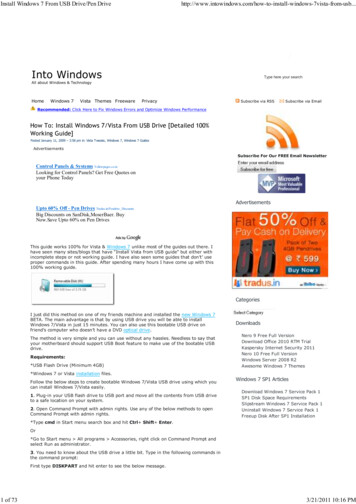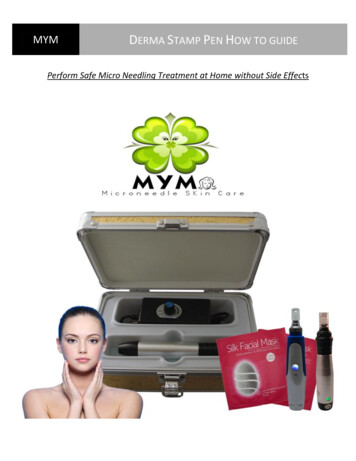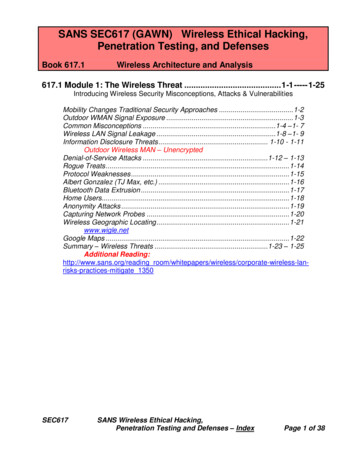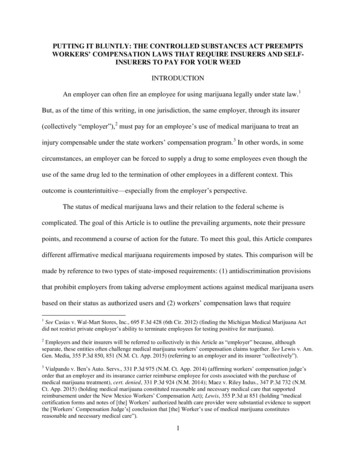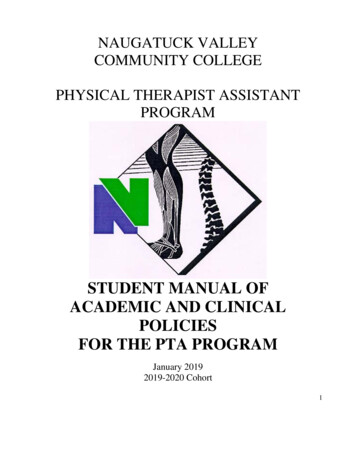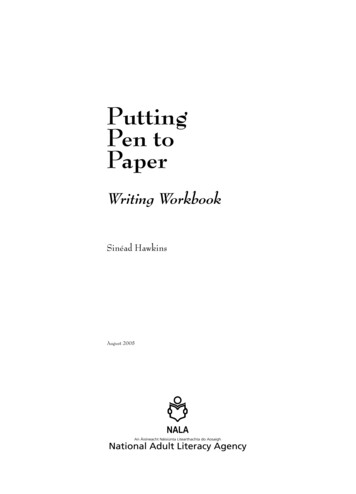
Transcription
PuttingPen toPaperWriting WorkbookSinéad HawkinsAugust 2005
Table of ContentsNote for Tutors .1Introduction .2Tips for getting started.4Capital Letters .6Writing Days and Months.12Writing Sentences .18More Capital Letters .24Writing Lists .29Writing Notes .36Writing a card .45Postcards .50Writing Dates.57Addresses .64Personal Letters .70Formal Letters .77Filling in Forms .86Many thanks to Ronan Byrne, my family and friends. My work colleagues in DALCand Valerie Kerr for help with editing. Maureen Nevile and Jennifer Lynch for theirexpertise and guidance throughout.ii
Note for TutorsThis Writing Workbook was originally designed for the NALA LiteracyTools website. The worksheets were aimed at individual learners whocan access the website and wish to improve their writing.Our aim was to make this workbook clear, relevant and practical withtips and ideas for basic writing skills, providing plenty of opportunities forpractice.It is also compiled as a resource to be used by tutors with one to one orgroup learners. The worksheets become more difficult as you progress.Feel free to dip in and out in order to suit your learners’ needs anddevelop their writing skills.Each learner should have their own workbook but please photocopy theworksheets as needed to provide extra practice.We also hope that tutors will be able to supplement this workbook withother resources.Enjoy using the Writing Workbook!1
IntroductionWriting is about putting information and thoughts into words on paper.There are many reasons why you might need to write something down. To give informationTo get informationTo keep in touchTo keep a record of something importantTo help you rememberThere are many times when you might want or need to write.Here are some examples: Taking phone messagesWriting cards to family and friendsSending a postcardWriting a letter to a friendWriting a note to schoolLists – shopping, things to doApplying for a jobFilling in a formIf you are writing for yourself – like a shopping list – you do not need toworry about spellings. As long as you can read it, that is what mattersmost.When you are writing for others it is important to check your spellingsand know that you have included all the right information.Remember that practice is the best way to improve!2
Can you answer yes to one or more of thefollowing questions?YesNoDo you try to avoid writing at certain times?ooDo you find filling in a form hard?ooHave your writing skills stopped you fromdoing something you would enjoy?ooDo you want to brush up on your writing skills?ooThen read on as this workbook will help you to improve yourpractical writing skills.3
Tips for getting started Make sure you are sitting comfortably. Warm up your hands by rubbing them together. Stretch and wiggle your fingers. Touch each finger to your thumb. Move your wrists in a circle to get your hand ready. Use a nice pen. Try out different sized pens and nibs to find one thatyou like to write with. You can buy a soft grip to make holding the pen easier. Try to keep your hand relaxed when you write and don’t hold the pentoo hard or too tight. Have something to lean on or use a thick pad of paper. If you are filling in an important form, make a copy so you can practisefirst or ask for extra forms. Take your time. Think about what you want to say. Get your ideas down first then write it out again. You can look up any spellings you are unsure of in the dictionary.What helps you write better?4
Good writing uses both capital and lower case lettersFill in the gaps with the missing letters of the alphabet Big letters are also called upper case or block capitals.ABCDEFGHIJKLMNOPQRSTUVWXYZ1.A C E G I K M O Q S U W Y2.B D F H J L N P R T V X Z3.D H L PQ U X4.A M Z5.E J N T Y Small letters are also called lower case letters.a b c d e f g h i j k l m n o p q r s t u v w x y z1.a c e g i k m o q s u w y2.b d f h j l n p r t v x z3.d h l pq u x4.a m z5.e j n t y5
Capital LettersNamesCapital letters are always used: For the first and last name of a personNora KellyPatrick MurphyWrite this list of names using capital letters in the right place. The firstone is done for you.Examplerita molloyRita Molloypat byrnemary kellyjim farrellmick fitzpatrickangela mcdonaghsara dunneAnswers on page 99Write your family and friends’ names.6
Name and addressCapital letters are always used: For the name of a place such as Fota or Liffey ValleyWriting your address such as Dublin, Cork.Write out the following names and addresses using capital letters in theright places. Make sure each part of the address is written on a differentline.valentine kelly, clover lane, sallins, co kildarevera doyle, parkgate, mount sion, co waterfordAnswers on page 99Where do you live? Write your address.7
Using ‘I’Capital letters are always used: When writing I in a sentence.If I try my best I know I will succeed.I wish I was in Carrickfergus.Write down what you did this morning afteryou got up.You could start off with:I got up at seven o’clock.I had a shower.8
Start of a SentenceCapital letters are always used: At the beginning of every sentenceWe learn something new every day.ExamplesI enjoy reading.In the summer I also do a bit of gardening.Golf is a good pastime.You don’t have to be very good to enjoy it.Write some sentences about what you did yesterday.Try and write two sentences at a time.Make sure you start with a capital letter and finish with a full stop.1.2.3.9
TitlesCapital letters are always used: For titles - formal way to refer to someoneMr – manMrs – married womanMs – single or married womanDr – doctorFr – priest, short for FatherSr – nun, short for SisterWrite your name with your title.ExampleMr Pat KennyDr Marie CaseyYou are organising a Murder Mystery Party. You are writing out invitationswith the names of the characters and you want to give them their propertitles. Use capitals for the names as well.Exampledr jekyllDr Jekyll1. mr hyde2. mr magoo3. dr watson4. miss jane eyre5. fr ted crilly6. mrs hyacinth bucketAnswers on page 9910
NamesCapital letters are always used: For the names of films, books, songs, television shows, shops,productsSpiderman, The Snapper, Irish Independent, White Christmas,Eastenders, Dunnes, CadburysWhat are your favourites?Favourite filmFavourite bookFavourite newspaperFavourite songFavourite television showFavourite shopFavourite snackSome names have words like and, the or of in the title and these havesmall letters.ExamplesThe Playboy of the Western WorldLord of the RingsBeauty and the BeastCan you think of another film or book that uses and, the or of in the title?11
Writing Days and MonthsDays of the WeekThere are seven days in a week.Each one starts with a capital letter.Look at the way each word is spelled.Each word ends in sdayLook at the way the word is broken down.Mon dayTues dayWed nes dayFri daySat ur daySun dayThurs dayFill in the gaps with the missing lettersM dayM dTu dT sWed dW n dTh dayT u dF daiurdaSat dayayS d12
Days of the Week – Fill in the gaps1. Most people go to work on a M d .2. The day after Monday is T e d y.3. Late night shopping is on a Th s .4. Most people work from M yto F a .5. The middle day of the week is Wed day.6. The weekend is S ur and S d .Answers on page 99My favourite day of the week is .I usually buy a newspaper on a .Sometimes I go for a walk on a .I meet my friends on a .My bin is collected each .WordsearchThe days of the week are hidden in the puzzle below. Can you SundayAnswers on page 99
Short form of Days of the WeekYou can write the days of the week in a short way if you are writing anote.Mon 9th JanuaryLook at the way the first three letters of the word are used to write theday in a shorter way.Then fill in the gaps with the short form of the ndayMonTueWedThuFriSatSunMonMake a note of what you need to do this week.ExampleMon Go to the Post OfficeMTWTFSS14
MonthsThere are 12 months in the year.It is really useful to be able to spell them all.Each month starts with a capital letterLook at the way the word is spelled and the way it is broken down.Fill in the gaps.1. JanuaryJan u aryJ u2. FebruaryFeb ru aryF r y3. MarchMar chM c4. AprilA pr ilA i5. MayM ayM6. JuneJ uneu7. JulyJu lyJu8. AugustAug ustAug9. SeptemberSep tem berS t b10. OctoberOct o berO o11. NovemberNo vem berNo b12. DecemberDe cem berD c erAnswers on page 10015
Writing the months1. The first month of the year is J y.2. Valentine’s Day is on 14th F r a .3. M ch 17th is St. Patrick’s Day.4. Easter sometimes occurs in A l.5. The month after April is .6. Lots of people have exams in J e.7. Children are on holidays in J l and A t.8. S em is when children start school.9. Halloween is in O o .10. The month before Christmas is ember.11. Christmas is in em .Finish off the sentences by writing in a monthThis month isLast month wasNext month isMy birthday is in.My favourite month is.I like to take my holidays in .I know someone with a birthday in.The month after my birthday is .16
Short way of writing the months and yearsWhen you are writing down the date in a personal letter or on a note youmight like to write the month in a shorter way.22nd January 2005or22nd Jan 2005You write the first 3 letters of the month to show the whole month.Examples1. February2. SeptemberFebSeptThe only month with 4 lettersNow you NovemberAprilAugustDecemberYou can write the year in a short form as well. You use the last twonumbers of the year like the number plate on a car.Examples2005 is 052000 is 001999 is 99Write the following dates using the short form of the month and the shortform of the year.ExampleOctober 1968Oct 681. January 20053. December 20052. March 20064. August 1973Answers on page 10017
Writing SentencesWhat is a sentence?1. A sentence is a group of words that make sense when puttogether. It means something.2. A sentence begins with a capital letter.3. A sentence ends with a full stop.These are two short sentences.My name is Mary.I live in Galway.You can use the word and to put more information into your sentence.Be careful not to make your sentences too long!A good tip is to use and only once in each sentence.ExampleMy name is Michael and I live in Mayo.This is a sentence because:It makes sense and we can understand it. It begins with a capital letter. It ends with a full stop. 18
What is a SentenceQuestion – Is this a sentence?it was aAnswer – This is not a sentence because:It does not make sense and we can’t understand it. It does not start with a capital letter. It does not end with a full stop. Now you check. the yes box if you see a sentence here.1. the cat went to the.2. I can hear the dog barking.3. It is a lovely day.4. we went to the beach and thenYesNo Answers on page 100Match the beginning to the endingMatch the beginnings and endings to make a sentence. Then write outthe new sentence. The first one is done for you1. The weather isthe show will start.2. In the city thevery nice today.3. At eight o’clockand our team won.4. Our cat istraffic is very heavy.5. We went to the matchblack and white.1.Theweather is very nice today.2.3.4.5.Answers on page 10019
Put words into sentencesNow write some more sentences of your own.Write a sentence about something these words remind you of.Put each word in a sentence.ExampleChristmasWe always put up a Christmas tree.HolidayShoppingBirthdayBookReadWrite20
Writing SentencesAnswer the following questions.Try to use as many words as you can in your sentence.ExampleWhat is your name?My name is Mary.What is your name?Where are you from?How many are in your family?What is your favourite food?What do you like to do in your spare time?What do you like to do on a Saturday?21
Finish off these sentencesMake up a sentence using these beginnings.Don’t forget to end with a full stop.Last yearOn holidays IYesterdayTomorrowNext weekMy favourite22
Putting in the full stopPut the full stops in the right places to make two sentences.Write out t
This Writing Workbook was originally designed for the NALA Literacy Tools website. The worksheets were aimed at individual learners who can access the website and wish to improve their writing. Our aim was to make this workbook clear, relevant and practical with tips and ideas for basic writing skills, providing plenty of opportunities for practice. It is also compiled as a resource to be used .
